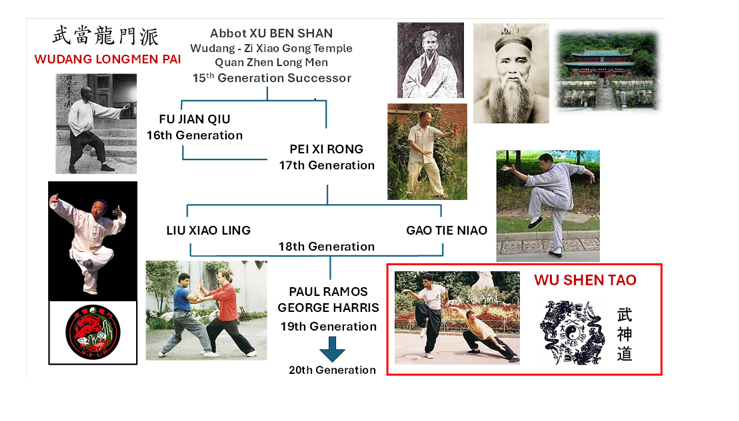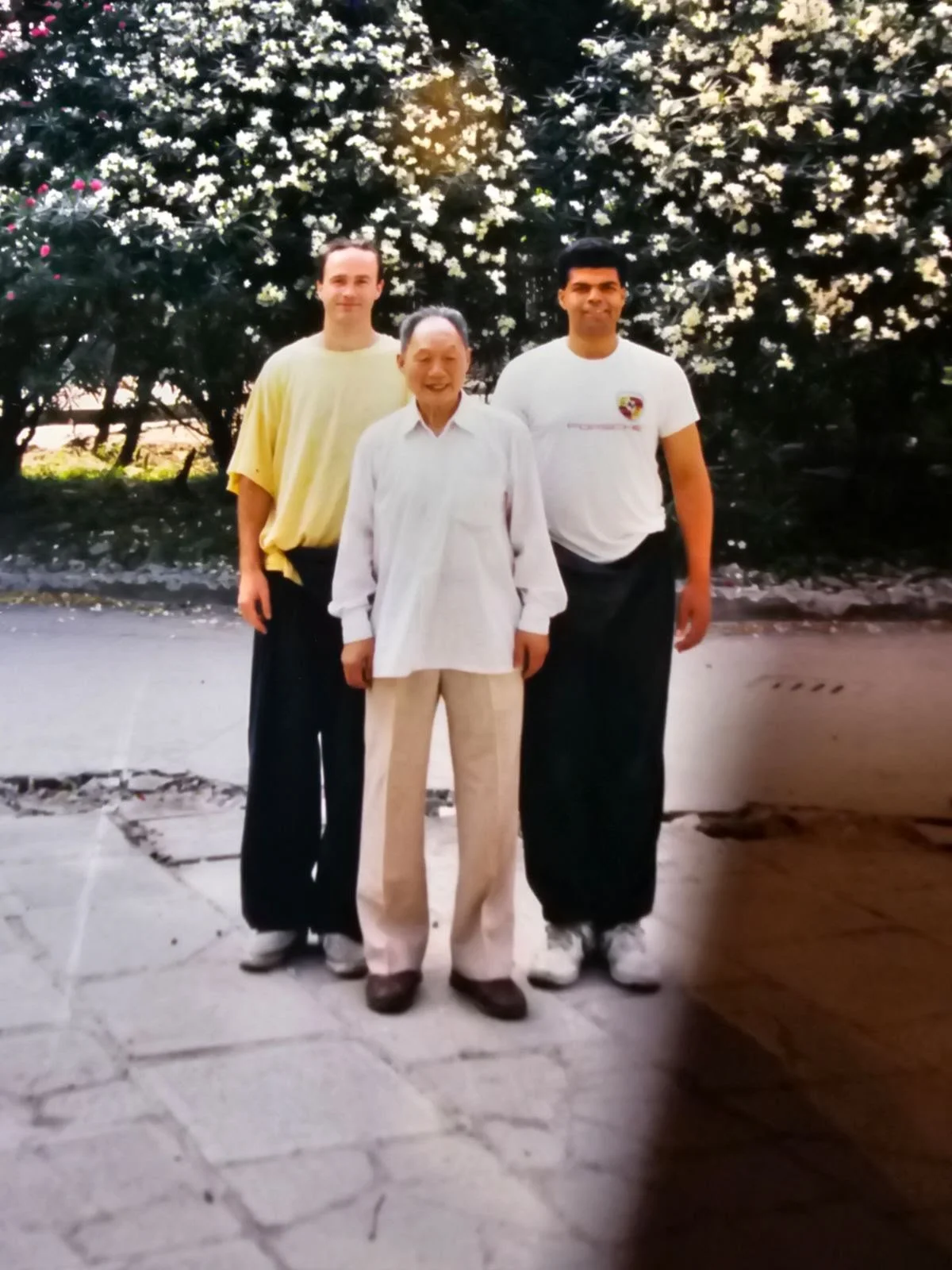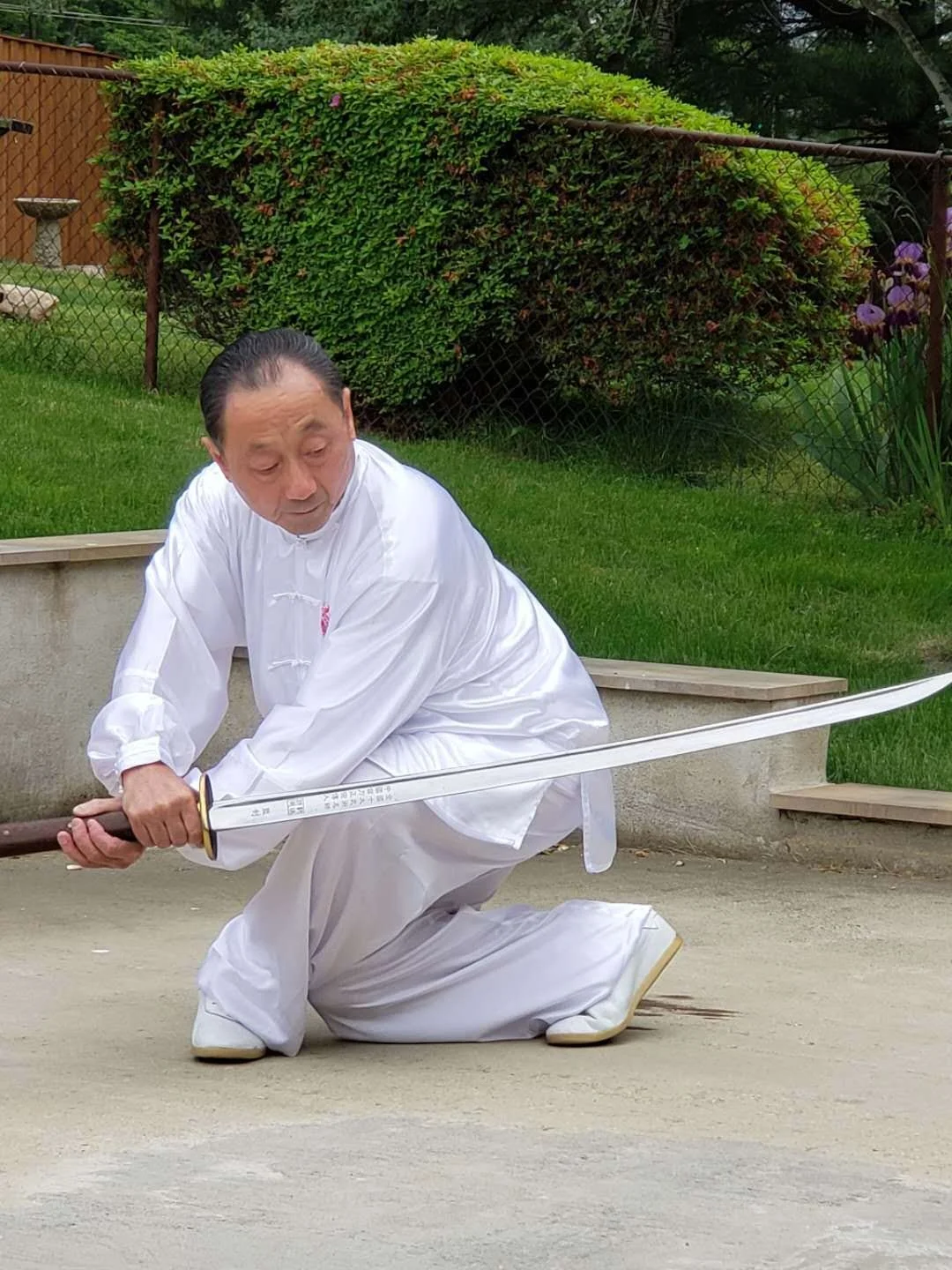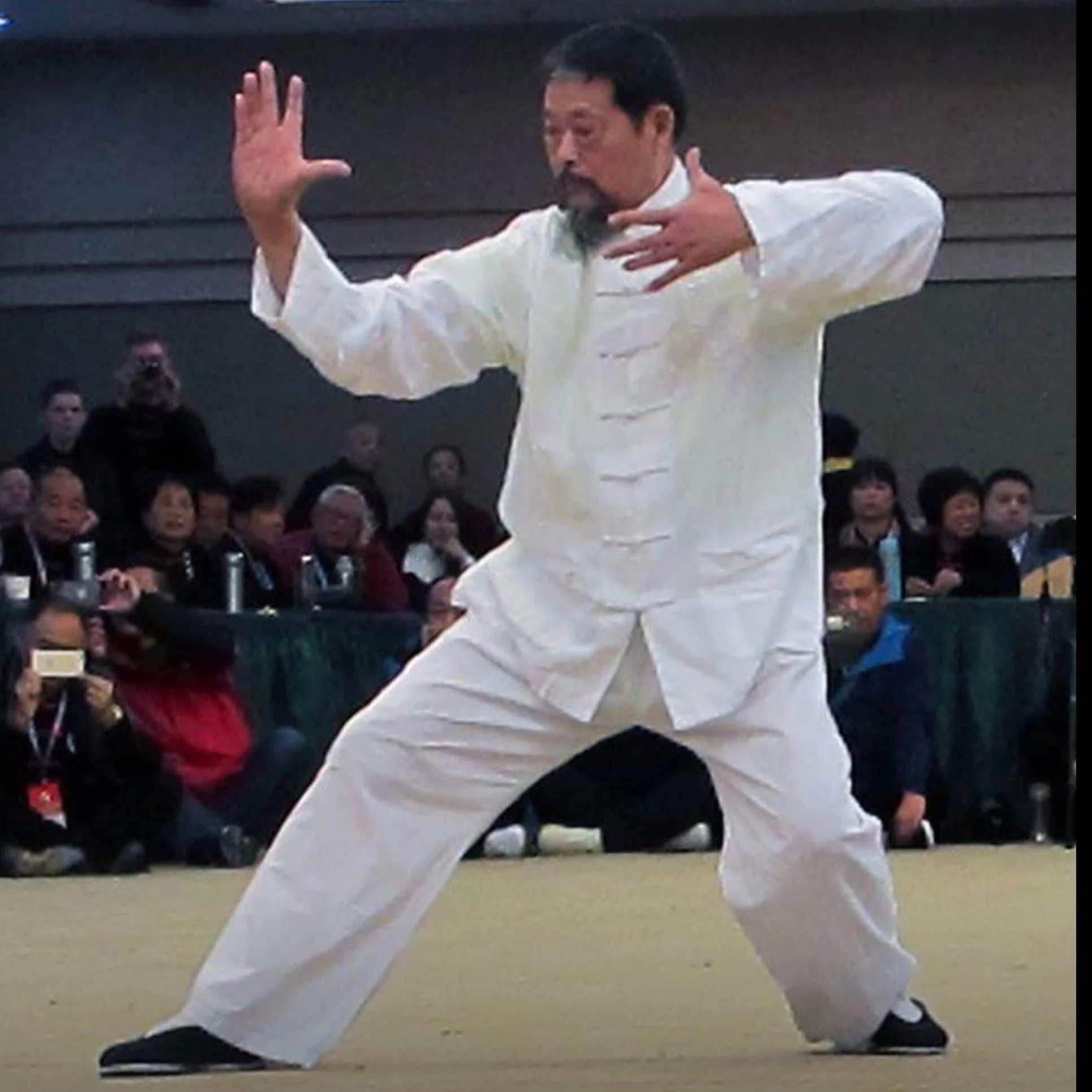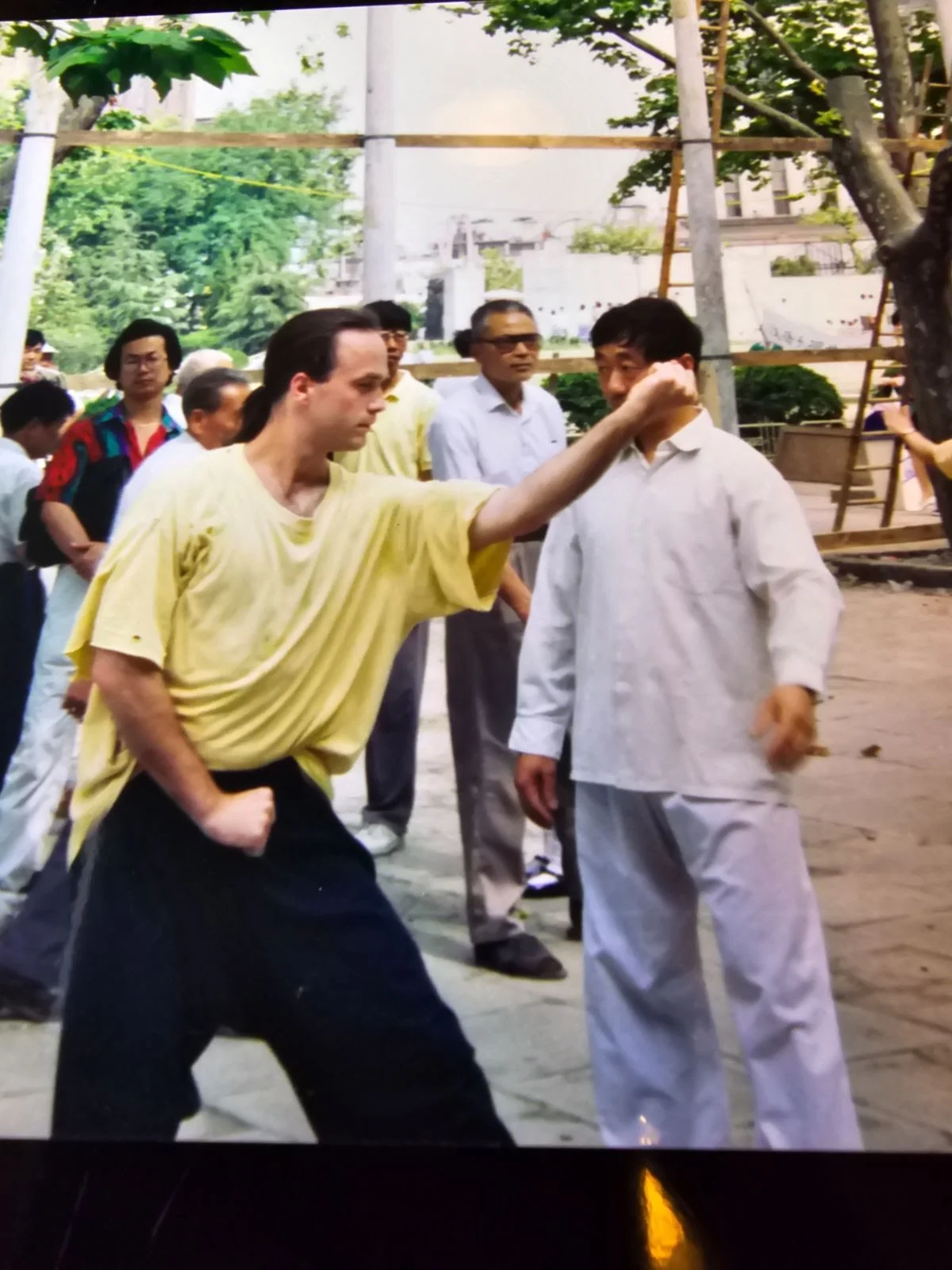Wu Shen Tao Lineage
Wudang Long Men Pai (武當龍門派)
Wudang Dragon Gate Sect - Complete Reality School
The Wu Shen Tao martial arts lineage traces directly to the Wudang Long Men (Dragon Gate) sect, a centuries-old Taoist tradition rooted in China's sacred Wudang Mountains. This unbroken transmission has preserved the internal martial arts of Tai Chi Chuan, Bagua Zhang, Xing Yi Chuan, and Wudang Fist through master-to-disciple teaching across twenty generations.
Wudang Mountain, one of China's "five sacred peaks," became a gathering place where Taoist masters studied meditation, healing arts, and martial self-defense in mountain seclusion. The Wudang Long Men sect represents the Dragon Gate lineage of the Quan Zhen (Complete Reality) school of Taoism.
15th Generation
Abbot Xu Ben Shan (徐本善)
Zi Xiao Gong Temple (Purple Cloud Palace), Quan Zhen Long Men
In his early twenties, Xu Ben Shan traveled alone to Mount Wudang, drawn to its legendary temples and martial traditions. He became a monk at Zixiao Palace, studying under Abbot Wang Fumiao and later Master Ming Liao, who taught him internal martial arts.
Through dedicated practice—running mountain paths at night to develop light skills and endurance—Xu Ben Shan mastered ancient methods and created innovations of his own, including the Wudang Thirty-Six Kung Fu. This set of exercises, combining gentleness with power, earned him recognition as Grand Master of Wudang. He was appointed head of Wudang Mountain Dao and resided at Zixiao Palace for over fifty years, also practicing medicine and serving the mountain community.
In 1929, Master Fu Jian Qiu and his disciple Pei Xi Rong traveled to Wudang on the recommendation of sword master Li Jing Lin. In a historic exchange, Fu taught Xing Yi to Abbot Xu, while Xu taught Wudang arts including Wudang Yuan Gong, Lvzu Chun Yang Sword, and Qian Kun Ball. This collaboration spread Wudang kung fu beyond the mountain for the first time in generations.
16th Generation
Fu Jian Qiu (傅剑秋)
Fu Chang Rong | Fu Xia Nong (art name) | He Shan (Taoist name)
Born in 1880 in Tianjin, Fu Jian Qiu became one of China's most celebrated martial artists. He began studying Xing Yi in 1903 under Grandmaster Shen Wan Lin, and by 1909 had become a disciple of both Grandmaster Li Cun Yi (founder of the Association of Chinese Martial Artists) and Liu Feng Chun (head of the Bagua Zhang section).
In 1919, Fu's martial skill was proven in Northeast China, where he defeated both a Russian strongman and a Japanese samurai. General Zhang Zuo Lin appointed him Wushu Coach of the Northeast Army and instructor to his personal bodyguards.
During his 1927 visit to Wudang Mountain with Pei Xi Rong, Fu converted to Taoism and received the name He Shan as a 16th generation disciple of the Dragon Gate sect. His friendship with Yang Style Tai Chi Master Niu Chun Ming led to groundbreaking cross-training that laid the foundation for integrating the three internal martial arts. Fu co-authored influential texts including The Art of Xingyi Ci Spear, The Art of Xingyi Pi Dao, and Guo Shu Teaching Manual.
17th Generation
Pei Xi Rong (裴锡荣)
Born in 1913 in Raoyang County, Hebei Province, Pei Xi Rong came from four generations of Traditional Chinese Medicine practitioners. He integrated this medical heritage with his martial training under Fu Jian Qiu, while also studying Bagua Zhang with Huang Bo Nian and Jiang Rong Qiao, and receiving instruction from Xin Yi master Bao Xian Ting.
In 1929, he accompanied his teacher to Wudang Mountain, where he studied under Abbot Xu Ben Shan and was formally inducted as a 17th generation disciple of the Wudang Long Men sect. Master Pei's vast knowledge encompassed Shaolin Wu Xing Quan (five animals), Ying Zhua Quan (eagle claw), Mi Zong Quan (lost track boxing), Ba Ji Quan, and numerous weapons.
Grandmaster Pei with George Harris and Paul Ramos in Shanghai, China
Master Pei believed Wudang was the original source of internal martial arts, uniquely combining the gang jin (hard power) of Xing Yi, the heng jin (horizontal power) of Bagua, and the hua jin (transforming power) of Tai Chi. In his later years, he emphasized that martial artists should cultivate themselves according to Taoist principles of virtue, character, and spiritual development—making this the true heart of Chinese martial arts. He established himself as the secular Grandmaster of the lineage in Shanghai, China.
18th Generation
Liu Xiao Ling (刘晓凌) and Gao Tie Niao (高铁鸟)
Grandmaster Liu Xiao Ling was born in 1950 in Shanghai. In the early 1960s, he began training under Master Jing Xiang Bao, a student of the famous Dong Zhong Yi, building a strong Shaolin foundation. In the early 1970s, he became a disciple of Grand Master Pei Xi Rong, studying Hebei Xing Yi, Bagua, Tai Chi, Wudang arts, and Qigong. He later studied Liu He Ba Fa (Water Boxing) in the 1980s and expanded his knowledge with Master Guo Rei Xiang (one of China's ten best masters of his era), learning Tong Bi, Pi Gua, and Miao Saber.
Grandmaster Liu in Maryland
Master Liu competed successfully in traditional tournaments from 1978 to 1983, winning gold at the 1982 National Traditional Wushu Competition for Xing Yi Thirteen Spears. He has served as director of numerous martial arts research institutes and was among the first martial artists awarded 6th dan by the Chinese government in 1999, later receiving 8th dan in 2013. In 2000, he came to the United States, teaching at Wu Shen Tao and establishing his own Wudang Martial Arts school in Takoma Park, Maryland.
Grandmaster Gao Tie Niao was born in 1948 in Wujin, Jiangsu Province. He began his martial arts training under famous Shaolin master Jin Xiang Bao, studying external styles and weapons including sword, broadsword, spear, staff, and hook, building a strong foundation.
Grandmaster Gao in China
At age 18, Master Gao began studying with Master Pei Xi Rong. Over more than 40 years of close training, he mastered Xing Yi Quan, Bagua Zhang, Tai Chi Quan, and Qigong, while also studying Daoist theories, I Ching, Chinese medicine, and Tuina massage. As one of two official inheritors of Master Pei's arts, Master Gao serves as chairman of Shanghai Bagua Zhang Association and Shanghai Wudang Qigong Study Institute. He has trained students throughout China and internationally, including the United States, Canada, Sweden, Norway, Denmark, Japan, Singapore, and Hong Kong.
Both Grandmasters Liu and Gao maintain the complete transmission of Wudang Long Men internal arts, preserving the knowledge passed from Abbot Xu Ben Shan through Pei Xi Rong.
19th Generation
Paul Ramos and George Harris
In 1993, Paul Ramos and George Harris traveled to Shanghai seeking authentic internal martial arts training. They became 19th generation disciples of the Wu Dang Long Men sect under Grandmasters Liu Xiao Ling and Gao Tie Niao.
In 2010, Master Ramos achieved historic distinction as the first American recognized by 18th generation masters GM Gao Tie Niao and GM Liu Xiao Ling as a 19th generation Master of the Wudang Long Men lineage. George Harris was then recognized as the second American 19th generation Master.
Masters Ramos and Harris continue training under their teachers, deepening their understanding and integration of the different internal systems. Through Wu Shen Tao, they preserve and transmit the complete curriculum including Wudang Yuan Gong, Wudang Tai Chi, Yang and Chen Style Tai Chi, Bagua Zhang, and Xing Yi Chuan.
Other 19th Generation Wudang Long Men Masters include Thomas Johnson, Alexander King, and Terence Nicholson
20th Generation
Wu Shen Tao Disciples
Wu Shen Tao has trained numerous 20th generation disciples of the Wudang Long Men lineage who carry forward this centuries-old tradition:
Eric Putney, Michael Daryabeygi, Kenny Chrzanowski, Jerry Simpson, Ted Curtis, William Dunlap, Julian Weaver, Stephen Genus, Evan Colton, Toba Adewusi, Alex Zito, Jeff Bandy, Joe Dudley, Erik Dubois, and Kristen Fang.
These practitioners dedicate themselves to preserving and teaching the internal martial arts for future generations.
The Wu Shen Tao Tradition
At Wu Shen Tao, we honor this unbroken lineage by maintaining traditional teaching methods while making these profound arts accessible to modern practitioners. Whether students seek health benefits, martial skill, or spiritual development, we preserve the depth and authenticity passed down through twenty generations of dedicated masters.

